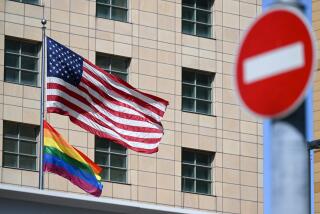Preventing bias on the job
Even before President Obama endorsed same-sex marriage, that cause had become synonymous in many minds with gay rights. But an equally important item on the equality agenda is protection of gays, lesbians and transgender people from job discrimination.
Last week the Senate Committee on Health, Education, Labor and Pensions held a hearing on the proposed Employment Non-Discrimination Act, or ENDA, which would outlaw workplace discrimination on the basis of “actual or perceived sexual orientation or gender identity.” Sixteen states, including California, and 140 localities protect gays and lesbians from discrimination, but 56% of the U.S. population lives in areas without such protection. That would be remedied with the enactment of ENDA.
Even if discrimination on the basis of sexual orientation were rare, the federal government would have reason to outlaw it, as it has done with bias based not just on race and gender but also on religion and national origin. But there is strong evidence that gay and lesbian workers are treated unfairly.
At last week’s hearing, M.V. Lee Badgett, the research director of the Williams Institute for Sexual Orientation Law and Public Policy at UCLA, cited a 2008 study indicating that 42% of a national random sample of lesbian, gay and bisexual people had experienced employment discrimination at some point in their lives. In the largest survey of transgender people to date, 78% of respondents reported experiencing at least one form of harassment or mistreatment at work.
In the past, there was controversy among supporters of ENDA about whether to include protections for transgender employees. In 2007, Rep. Barney Frank (D-Mass.), a champion of the legislation, reluctantly stripped protection for “gender identity” from the bill to increase its likelihood of passage. “This transgender thing, this is new,” Frank said lawmakers told him. “This scares people.”
Since then, awareness of both transsexuals and the fact that they encounter discrimination has increased. In a 2011 poll of likely 2012 voters conducted for the Center for American Progress, 73% of respondents supported protecting both gay and transgender people from workplace discrimination. That evolution in public opinion should embolden the Senate to approve a comprehensive ENDA. Prospects are obviously more complicated in the House. But some of the Republicans who now control that chamber — including some opponents of same-sex marriage — may be amenable to the proposition that workplaces should be free of discrimination.
Whatever people think of same-sex marriage, no one can justify firing or refusing to hire a qualified worker because of his or her sexual orientation or gender identity.
More to Read
A cure for the common opinion
Get thought-provoking perspectives with our weekly newsletter.
You may occasionally receive promotional content from the Los Angeles Times.






